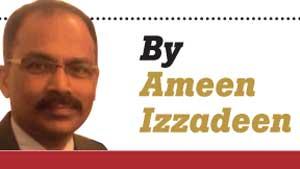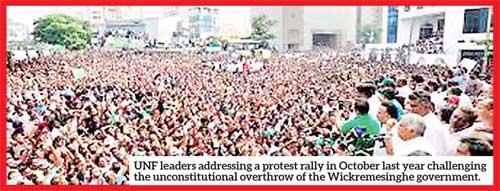Reply To:
Name - Reply Comment
 his is a presidential election year and pre-campaigning has already begun. Although none of the main parties has declared who its presidential candidate would be, election mathematicians are already busy mapping out the winning probabilities of likely candidates.
his is a presidential election year and pre-campaigning has already begun. Although none of the main parties has declared who its presidential candidate would be, election mathematicians are already busy mapping out the winning probabilities of likely candidates.
Like in a handicap horse race, the ruling party carries the heaviest burden of liabilities. Weighted against it are its failures, unfulfilled promises and the anti-incumbency factor.
Given the ruling United National Front government’s not-so impressive mark sheet, it faces an arduous task in convincing the voters to make its candidate win. It is too early to predict that UNF leader Ranil Wickremesinghe and Sajith Premadasa can form a winning combination, with the latter being promoted as the prime ministerial candidate. One does not know what tricks the UNF’s opponents have up their sleeves. It is doubtful that the UNF plans counter-strategies to defeat its opponents’ plans. The October 26 coup against Prime Minister Wickremesinghe bears testimony that the party, in its naiveté, had not anticipated President Maithripala Sirisena’s stab in the back, just as it was caught unawares when the then President Chandrika Kumaratunga dissolved parliament in 2003, while Wickremesinghe’s party enjoyed a comfortable majority.
A political party spying on rivals is basic political behaviour. Politics is about capturing, maintaining and enhancing power. A seasoned political party will place its agents in rival parties to get information. The famous Watergate incident that led to the resignation of the then US President Richard Nixon was all about his attempt to bug the Democratic Party office to steal information. Also in the US, during the last presidential campaign, a former British Agent was hired by a research group to prepare a dossier on Donald Trump’s Russian connection. It was funded by the supporter of a Republican candidate during the primaries and later by the Hillary Clinton team. This is politics 101. 
Many would agree that after the demise of Gamini Atukorale, there has not arisen a strategist of repute in the UNP. Is there anyone in the Grand Old Party to match the skills of Sri Lanka Podujana Peramuna architect Basil Rajapaksa? He is said to be working out a plan to field a ‘front’ Tamil candidate to deny the UNF part of the Tamil votes, something in line with the plan that bore fruit at the 2005 race.
Like all ruling parties, the UNF came to office by duping the voters into believing that, if elected, it would establish good governance, eliminate corruption, end the culture of violence in politics, restore media freedom, improve the economy, bring in more foreign investors and create jobs. Such gimmickry is fast losing its shine, with voters becoming exposed to social media memes and wisecracks on the ruling party’s failures.
Except for a few, the UNF pledges remain under-fulfilled, generating negative feelings in the minds of the voters. Ask psychologists, they will say that, in human minds, negative memories – about failures, harms and hard feelings -- stick better than the good memories. We often forget the good things relatives, friends or neighbours have done for us, and become cross with them, the moment they harm us, intentionally or unintentionally, with their words, actions or omissions.
Thus there is nothing unusual, when people talk less about the UNF’s positive achievements, such as its successes in curbing political violence, restoring media freedom to a great extent and bringing in more checks and balances to prevent abuse of power by the government arms.
 However, for people to talk more about a government’s achievements and less about the unfulfilled promises, its accomplishments need to be extraordinarily impactful, like the war victory of the Mahinda Rajapaksa government. It is because of the 2009 civil war victory that Rajapaksa still remains a political magnet capable of drawing millions towards him, despite negativities linked to nepotism, corruption and human rights violations.
However, for people to talk more about a government’s achievements and less about the unfulfilled promises, its accomplishments need to be extraordinarily impactful, like the war victory of the Mahinda Rajapaksa government. It is because of the 2009 civil war victory that Rajapaksa still remains a political magnet capable of drawing millions towards him, despite negativities linked to nepotism, corruption and human rights violations.
But as far as the UNF government is concerned, none of its achievements during the past four years is as glittery as the Rajapaksa crowning jewel -- the war victory. If only the UNF government had won the economic war and achieved high economic growth, or succeeded in the anti-corruption battle, it could have, at least, had a few aces to match the Rajapaksa magic in a political contest.
A government is re-elected based on its performance. The manner in which a government in office handles the economy is a key factor that decides its fate at the reelection. The present government’s scorecard on economic performance is pathetic, if not below par. Widely being discussed or mocked at is the yawning gap between what was expected of the government four years ago and what has been delivered. The mega projects it touted as game changers are stuck or moving at snail’s pace without adequate funds. With most Sri Lankan voters being poor in their economic literacy, they grasp not fully the government’s struggle to deal with the debt burden, balance of payment crises and other economic problems.
Most people thought that if the business-friendly UNP was in government, foreign direct investments would flood the country and transform the nation into a next Malaysia. But as the government’s term nears its final year, the economy is growing at a dismal 3.5 percent – the worst in South Asia. The FDI flow has not happened as it did during the 1977 UNP regime. In parliament recently, opposition legislators pointed out that instead of a foreign investment inflow, the government has triggered an outflow, with the stock market experiencing a prolonged nose-dive.
There was much fanfare over the March 24 ceremony to announce what has been touted as Sri Lanka’s biggest ever single investment – the US$ 3.8 billion oil refinery. But there are more questions than dollars in the project.
True, the economy suffered a blow during the 51-day political crisis last year, but to say that it was the root cause for the misery is misleading the people. The excuse could have been plausible, it the UNF had attributed the slow growth to its national government experiment going wrong, leading to instability, which, in turn, eroded investor confidence. There is little national and much cloak-and-dagger politics in Sri Lanka’s national government experiment, where the undercurrent is one of party interests superseding national interests.
On the corruption score, too, the government’s performance appears to be a sham. The very coalition that came to end corruption came to be embroiled in scam after scam – with the bond issue tarnishing the UNF’s image beyond repair.
In addition, the government is seen as deliberately slowing down investigations and prosecution of major crimes said to have taken place during the previous regime. The government’s failure has added credence to the opposition’s claims that the investigations are a witch-hunt.
The power cuts are also a testimony to poor governance. The government stands accused of not being proactive enough to take measures to overcome the power crisis, though warnings had been sounded since 2012.
With these being some of the weights on the UNF handicap horse, the party cannot afford to slumber with a false sense of complacency, if it wants to win the next presidential election.